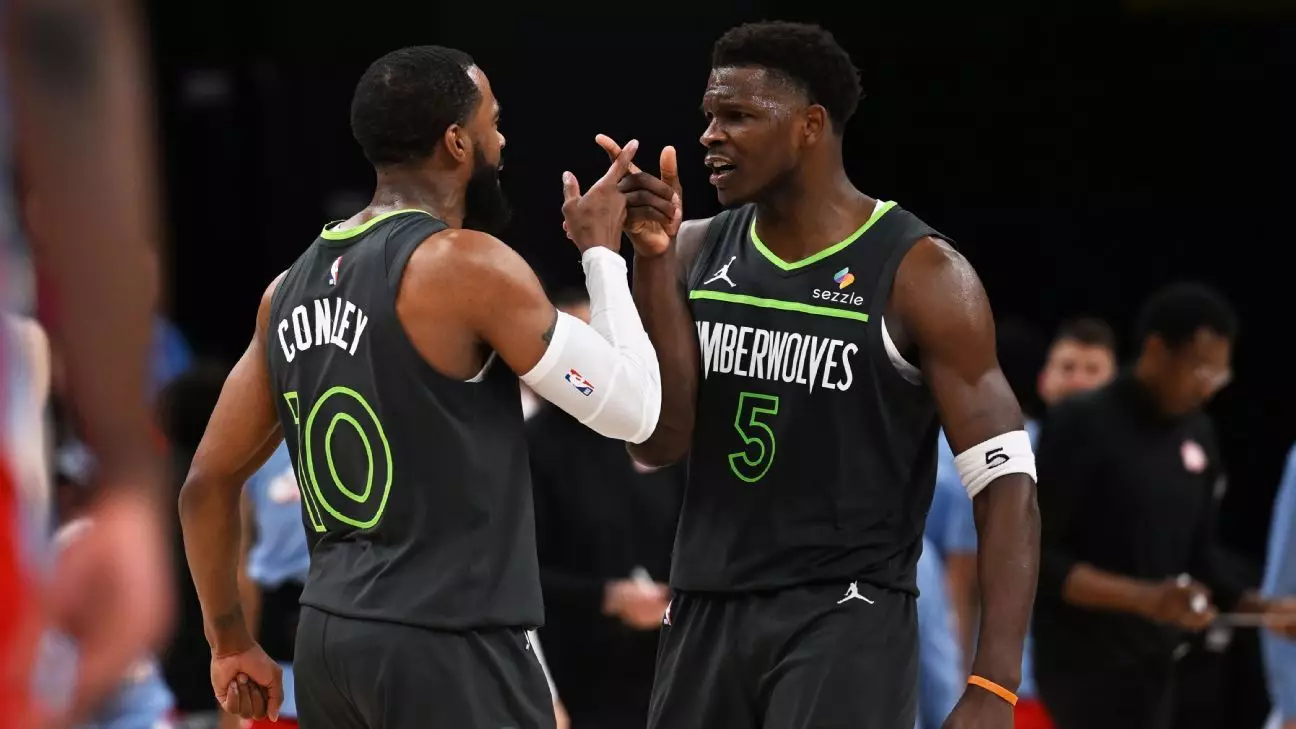In a twist of fate that showcases both the absurdity and unpredictability of sports, the Minnesota Timberwolves received jubilant news over the weekend: star player Anthony Edwards would take the court for their crucial season finale against the Utah Jazz. Just a brief moment before, it seemed that the Timberwolves were on the verge of being deprived of one of their most talented players for what could have been a crucial game—a direct byproduct of the NBA’s stringent rules surrounding technical fouls. Edwards had unwittingly racked up an astounding 18 technicals this season, some of which could be considered questionable at best.
The NBA, however, made the unusual yet welcome decision to rescind the technical foul handed to Edwards following a frustrating incident during the Timberwolves’ dominating 117-91 victory over the Brooklyn Nets. When the league chose to pull back on that technical foul, it did more than just spare Edwards a suspension; it revealed the ongoing tension between players and the league’s officiating protocols.
The Technical Foul Dilemma
Technical fouls are the kind of misplaced wrath that often haunt the narratives of professional basketball. The complexities surrounding these fouls often feel like a bureaucratic nightmare, starkly contrasting the fast-paced, instinct-driven nature of the game. Edwards found himself on the wrong end of this duality when he received a technical for expressing his bewilderment toward a foul call mid-game. The notion that a simple expression of frustration can lead to an automatic suspension—like a chain of dominos tumbling down—sheds light on how the league’s disciplinary measures can feel detached and excessive. Edwards openly grappled with the absurdity of the situation, admitting, “I don’t feel like it should’ve been a tech.” This sentiment resonates with fans and players alike, creating a shared understanding of how inconsistent officiating can unfairly impact games.
The suspended demand for civility in sports looks fundamentally flawed when viewed through an empathetic lens. Edwards’ predicament became a rallying cry for a larger issue within the league: the glaring disparity often seen between the language players use universally and the rigid way rules are enforced. It brings forth questions about freedom of expression in sports culture.
The Pressure of Playoff Seeding
With the Timberwolves hovering precariously between playoff positions, the stakes of Edwards’ participation extend far beyond mere pride. Currently holding a record of 48-33, the Timberwolves are in a dogfight for optimal playoff positioning in an Eastern Conference rife with competition. A victory against the Jazz can potentially elevate them to a fourth seed, which is not merely about securing placement—it is about the luxury of home-court advantage. However, the specter of a lower-seeded position hangs ominously over them, presenting the grim prospect of needing to wrestle through play-in games to secure their postseason dreams.
The unresolved tension of whether Edwards would be present during this decisive game stoke fears for fans, adding yet another layer of urgency for a franchise that has wrestled with inconsistency in previous seasons. Such concerns underscore the thrill and cruelty of sports; a single moment’s uncertainty can dramatically alter the course of a team’s trajectory.
The Double-Edged Sword of Officiating
Moreover, the episode exposes the double-edged sword of NBA officiating. Edwards, despite being a premier talent poised for stardom, has found himself navigating the intricate labyrinth of player expectations, media scrutiny, and league conduct. The Timberwolves’ coaching staff echoed this sentiment; coach Chris Finch expressed confusion about why the technical foul was even assessed in the first place, stating, “It didn’t seem like there was anything egregious or overly demonstrative.” It begs the question: Are the measuring sticks for such judgments too rigid, and do they fail to account for the complex emotional landscape of players?
As coaches, players, and fans rally together to critique this flawed system, one cannot help but wonder if a reevaluation is due. The emotional whirlwind that fuels great athletic performance should not become fodder for punitive measures but nurtured as part of what makes the game electric and relatable.
Ultimately, this incident is not just about Edwards or the Timberwolves. It’s a call to reflect on how our relationship with sports often mirrors broader societal dynamics—where pain, struggle, and redemption come together to create our heroes. Edwards’ journey embodies a youthful resilience that pushes against an overly sanitized culture, positioning him not only as a skilled player but as a symbol for change within the league. As he gears up to face the Jazz, it’s not just his talent we will be watching; it’s the embodiment of a fight against the very constraints that seek to limit expression in one of our most beloved games.

